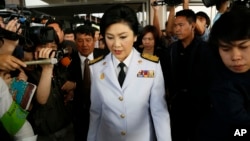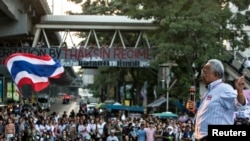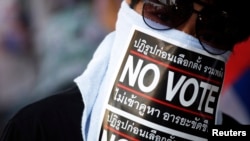BANGKOK —
Thailand says it will carry out scheduled national elections Sunday, Feb. 2, despite ongoing political unrest and recent violence. Protesters have vowed to disrupt the vote, as part of their months long effort to oust the government, and the main opposition party is boycotting the polls.
The Election Commission Tuesday reluctantly agreed to go forward with the elections, after a meeting with the caretaker government of Prime Minister Yingluck Shinawatra.
The commission had pushed for postponing the polls after months of anti-government protests and violent clashes that left 10 dead and scores wounded.
Outside the meeting at Bangkok’s Army Club, hundreds of anti-government protesters demonstrated and threatened to push through lines of riot police and military guarding the compound. A nearby protester was shot and wounded.
While the government remains committed to holding the vote Sunday, the election will not end Thailand's political crisis.
Because protesters blocked candidate registration in some districts in December, some constituencies have no candidates, and protesters have vowed to shut down polls in Bangkok and southern provinces.
Altogether, those measures are likely to prevent enough elected lawmakers from convening parliament and forming a government.
Election commissioner Somchai Srisuthiyakorn says if the government goes ahead with the February 2 election, there could be delays with by-elections [to fill the empty seats] so it could be three to five months before the parliament would be able to convene.
The prime minister’s ruling Pheu Thai party is widely expected to sweep the polls and her supporters have denounced any attempt to delay the vote.
Protesters want to suspend elections and replace the government with a ruling council to usher in unspecified reforms. Their only clear goal is to rid the government of any influence by former Prime Minister Thaksin Shinawatra, the caretaker prime minister's older brother who was ousted in a 2006 coup.
While most in Thailand support the vote, political analysts agree elections alone will not resolve the country’s deep political divisions.
“I doubt there’s serious talks going on behind the scenes to sort it out because I think the major players are committed to winning still, they are not really interested in compromise," said Chris Baker, an author and commentator on Thai politics.
The division broadly pits Thailand's working class farmers in the north and northeast, who support Thaksin, against middle and upper class royalists in Bangkok and the south who call him corrupt and power hungry.
The protests started over attempts by the ruling party to pass an amnesty bill that would have allowed Thaksin to return to Thailand. He lives in exile to avoid a jail sentence for abuse of power.
The amnesty bill was scrapped but protests continued and Yingluck called the snap election in November to try to quell the unrest. Authorities also called a State of Emergency and issued arrest warrants for protest leaders, though neither were enforced.
While the country prepares for elections, analyst Baker said Thailand's courts still could intervene.
“They are seen as a way to break the deadlock; so the number of questions that are raised about what happens next legally, what then happens if this government get broomed by the courts, exactly what happens next we are in a kind of constitutional impasse - that could be quite interesting,” said Baker.
Another legal threat to the ruling party gathered momentum Tuesday, when the National Anti-Corruption Commission launched an impeachment probe on Yingluck for her government's controversial rice-buying plan.
Reporter Ron Corben contributed to this report.
The Election Commission Tuesday reluctantly agreed to go forward with the elections, after a meeting with the caretaker government of Prime Minister Yingluck Shinawatra.
The commission had pushed for postponing the polls after months of anti-government protests and violent clashes that left 10 dead and scores wounded.
Outside the meeting at Bangkok’s Army Club, hundreds of anti-government protesters demonstrated and threatened to push through lines of riot police and military guarding the compound. A nearby protester was shot and wounded.
While the government remains committed to holding the vote Sunday, the election will not end Thailand's political crisis.
Because protesters blocked candidate registration in some districts in December, some constituencies have no candidates, and protesters have vowed to shut down polls in Bangkok and southern provinces.
Altogether, those measures are likely to prevent enough elected lawmakers from convening parliament and forming a government.
Election commissioner Somchai Srisuthiyakorn says if the government goes ahead with the February 2 election, there could be delays with by-elections [to fill the empty seats] so it could be three to five months before the parliament would be able to convene.
The prime minister’s ruling Pheu Thai party is widely expected to sweep the polls and her supporters have denounced any attempt to delay the vote.
Protesters want to suspend elections and replace the government with a ruling council to usher in unspecified reforms. Their only clear goal is to rid the government of any influence by former Prime Minister Thaksin Shinawatra, the caretaker prime minister's older brother who was ousted in a 2006 coup.
While most in Thailand support the vote, political analysts agree elections alone will not resolve the country’s deep political divisions.
“I doubt there’s serious talks going on behind the scenes to sort it out because I think the major players are committed to winning still, they are not really interested in compromise," said Chris Baker, an author and commentator on Thai politics.
The division broadly pits Thailand's working class farmers in the north and northeast, who support Thaksin, against middle and upper class royalists in Bangkok and the south who call him corrupt and power hungry.
The protests started over attempts by the ruling party to pass an amnesty bill that would have allowed Thaksin to return to Thailand. He lives in exile to avoid a jail sentence for abuse of power.
The amnesty bill was scrapped but protests continued and Yingluck called the snap election in November to try to quell the unrest. Authorities also called a State of Emergency and issued arrest warrants for protest leaders, though neither were enforced.
While the country prepares for elections, analyst Baker said Thailand's courts still could intervene.
“They are seen as a way to break the deadlock; so the number of questions that are raised about what happens next legally, what then happens if this government get broomed by the courts, exactly what happens next we are in a kind of constitutional impasse - that could be quite interesting,” said Baker.
Another legal threat to the ruling party gathered momentum Tuesday, when the National Anti-Corruption Commission launched an impeachment probe on Yingluck for her government's controversial rice-buying plan.
Reporter Ron Corben contributed to this report.











